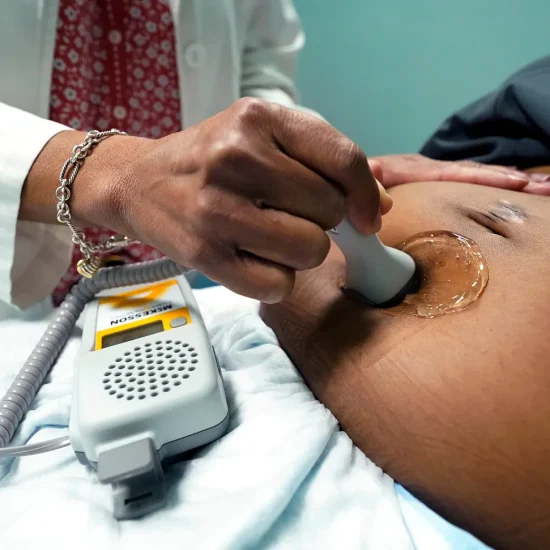

MY BODY, THEIR BABY: A Progressive Christian Vision for Surrogacy. By Grace Y. Kao. Stanford, CA: Stanford University Press, 2023. X + 258 pages.
Attempting to review a book about surrogacy might seem like a stretch for someone like me. After all, I’m what some would call a senior citizen. I’m male. My wife and I had no issues conceiving a child, though we only had one child. Although I am a retired pastor and a trained theologian/historian, I’ve never faced in my years of ministry questions from parishioners or others I’ve encountered as to whether surrogacy is permissible for Christians. Nevertheless, surrogacy is on the rise, and Christians are seeking out surrogates and serving as surrogates.

Robert D. Cornwall
While there are biblical stories that deal with surrogacy, with the best-known being Hagar, these are not necessarily happy stories. Besides Hagar, who was Sarah’s slave, there are the stories of two of Jacob’s wives, Bilhah and Zilpah, the slaves of Rachel and Leah who were used by the two sisters as surrogates in their rivalry. If Scripture doesn’t provide us with many helpful stories, how might contemporary Christians make sense of surrogacy since modern technology has created new opportunities and options that were not available to the biblical characters?
When it comes to Christian considerations, concerns and questions have been raised from many quarters, both left and right. Conservative “pro-life” folks might be concerned about the disposition of unused embryos, while feminists and progressives might be concerned about exploitation. While the concerns are worthy of addressing, is it possible to articulate a “progressive Christian vision for surrogacy?” Feminist/progressive Christian ethicist Grace Kao, Professor of Ethics and founding director of the Center for Sexuality, Gender, and Religion at Claremont School of Theology, offers an affirmative answer to the question. Not only does she offer an affirmative answer to the question, but in her book My Body, Their Baby, she reveals her own experience serving as a gestational surrogate for friends. Therefore, Kao brings not only her training in theology and Christian ethics to the conversation, she brings her personal experience.
Throughout My Body, Their Baby, Grace Kao weaves in her own story so that we can understand the decision-making process that went into her choice to become a surrogate. That includes revealing the basis on which she made that decision. I believe that My Body, Their Baby will be well received by many Christians who are pondering the question of surrogacy. That is because though surrogacy might be the “least common and most contested method of family expansion, surrogacy is nonetheless on the rise” (p. 3). There are numerous reasons why this is true, including the increasing availability of “assisted reproductive technology” or ART. She writes this book to respond to questions about whether this is an appropriate method of family expansion as well as to offer ethical guidelines for prospective parents and surrogates. While she has prospective parents and surrogates in mind as she wrote the book, it is a scholarly book.
As a reviewer, most of what Kao writes here was new to me. I agreed to review the book in part because Kao teaches at the seminary where my son has been a student. While he did not take classes from her, it was because of the school that I knew of her. Additionally, I am interested in developing a better understanding of the ethical dimensions of reproductive decisions. Even though I’ve not had the opportunity to discuss this option for family expansion, I have had conversations with people who have made use of a variety of fertility technologies to enhance their ability to become pregnant. While infertility is one reason for turning to surrogacy, growing numbers of gay men have also turned to surrogacy rather than adoption to build families (and Kao goes into some detail as to why this is true).
As I noted Kao teaches Christian ethics at Claremont School of Theology. She is also an ordained Presbyterian minister. She draws on both her academic and spiritual training to these questions. In the course of the book, she draws on four sources of wisdom—scripture, tradition, reason/secular sources of knowledge, and experience (her own and that of others). While this is a scholarly book, published by a university press (Stanford), I did find it to be relatively accessible. That is, although I read the book from the perspective of a nonexpert in the field, I could generally follow the arguments Kao was making. In large part that is due to Kao’s skill as a writer, but it is also due to the very personal nature of the issue at hand. As we read through the book we encounter discussions of theology, the Bible, and science, as well as her own story (autobiography). It’s that use of a personal story that keeps the reader connected to the discussion (especially if you are reading as one who is not personally affected by the topic).
Kao offers us a “primer on surrogacy in the first chapter of My Body, Their Baby. In this chapter, Kao provides the reader with a summary of the laws, logistics, and trends. It is a very helpful compendium of information that provides the foundation for what comes as we move through the remainder of the book. If you don’t know much of anything about surrogacy, especially from a medical perspective, by the end of the chapter you will be informed as to the major dimensions of surrogacy. This includes the legal aspects of surrogacy, especially in the United States, where there are no uniformities from state to state.
With this foundation laid, Kao begins addressing questions regarding surrogacy, beginning in Chapter 2 with a discussion as to whether surrogacy can create psychological harm. Part of the reason Kao chose to write the book was her desire to address the many questions posed to her after people discovered she was serving as a surrogate. One of the first questions she dealt with concerned the belief on the part of many that surrogacy can be psychologically harmful to the surrogate, to the family of the surrogate, and to the children who are produced via surrogacy. One of the questions she faces and unpacks in the book is whether a “surro-mom” (her term) will become so attached to the baby that when it is time to give up the child, the surrogate will be psychologically harmed. The fact is, in most cases, the answer is no. Since a surrogate takes on this responsibility to make a child available to people who cannot have a baby without help the surrogate knows that they will give up the child. As for the children born of surrogates, Kao emphasizes the need for transparency. These children need to know and understand where they come from so that they will not feel embarrassment or shame, something that hiding the facts of one’s birth can produce.
Kao devotes her third chapter to answering the question of whether surrogacy violates “distinctive feminist or Christian commitments.” She not only lays out the objections and concerns but answers them. Interestingly, feminists are concerned about such things as exploitation, the possibility that motherhood is redefined, and whether surrogacy undermines arguments for reproductive rights including the right to have an abortion. As for distinctly Christian concerns, she notes several, beginning with whether surrogacy violates God’s will for marriage, sex, and family. In other words, she addresses the concern that this is not the way things are supposed to be done. Then there is the question of infidelity. That is, does a woman’s decision to bear a child for another undermine marital vows of fidelity, even if the surrogate is not having sexual intercourse with someone? Unlike the story of Hagar, when it comes to modern forms of surrogacy, the surrogate might be artificially inseminated or have an embryo implanted in some other way. There is also the question of whether spare embryos are mistreated. While some would argue that adoption is the best option, Kao addresses the reasons why people might make a different choice. Again, she takes the questions and concerns seriously.
The first three chapters lay out the foundations of surrogacy and answer basic questions as to the ethical choices involved. Beginning in chapter four of My Body, Their Baby, Kao makes her argument for surrogacy from a progressive Christian perspective. Because she served as a surrogate means that she has considered the many questions raised about surrogacy. Thus, in Chapter 7, Kao lays out seven assumptions that are involved in deciding to become a surrogate or turn to surrogacy as an option. The first question addressed concerns the type of surrogacy to be chosen. Will it be gestational or traditional? In her case, it was gestational. That is, as a surrogate, she was not biologically related to the child she carried. Secondly, she was involved in a non-commercial surrogacy, such that she was not paid to carry the child beyond reimbursement for the expenses. The third requirement was that both the surrogate and commissioning parents lived in the same jurisdiction (there are legal issues related to location). Fourth, they agreed on access to care since IVF pregnancies carry higher risks. Fifth, there is the question of the status and quality of the relationship between surro-mom and the intended parents. In her case, they were friends before they made the arrangements. Sixth, the prospective parents made this decision only after engaging in serious discernment. Finally, they addressed questions posed by anti-natalists concerning whether it is appropriate to bring another life into existence. She responds to the questions by drawing on Scripture, Tradition, Reason, and Experience. As you can imagine this was rather enlightening.
With the seven assumptions laid out and addressed, in Chapter 5, Kao offers seven principles for a “progressive Christian framework for surrogacy.” This is the key to the book because it’s here that she builds on what has been shared earlier to provide a foundation for decision-making regarding surrogacy. She addresses personal, legal, and moral considerations with these seven principles. The seven principles include 1) Discernment without haste (both intended parents and prospective surrogates should not make quick decisions). 2) Place covenant before contact. Surrogacy involves legal contracts, but before that, both parties need to address several important personal questions. 3) Empathy, Care, and Stewardship. She addresses here the possibilities of hurt, disappointment, and even mistreatment. Again, these concerns are rooted in the covenant relationship. 4) Medical Self-Determination. This is an important principle, as the health and concerns of the surrogate are paramount. 4) Disclosure, not secrecy. In other words, intended parents need to be transparent with the child produced through surrogacy, and more selectively with others. We’ve already seen some of the reasons for this earlier in the book, but this again is key. Secrecy never works. Kao goes into detail as to why, when, and how to disclose. Principle 6 is very important because it addresses concerns raised by others who raise questions about surrogacy, especially as to whether it is going to be harmful psychologically or exploitative. It’s quite simple: “Trust Women.” Finally, there is the matter of Social Justice. These issues include social inequities, health care costs, and resource allocation (surrogacy is not cheap and it is something wealthier persons are likely to undertake).
The sixth and final chapter of My Body, Their Baby assesses “the ethics of more complex surrogacy arrangements.” These include commercial surrogacy (the surrogate is being paid and may not know the intended parents). Again, the question of exploitation is raised, such that surrogates might be impoverished. There is the question here as well of commodifying children—are these children simply a commodity to be bought and sold? While there are appropriate concerns raised, Kao provides some support for the practice, within certain guidelines. Then there are questions of cross-border surrogacies. That is, when the intended parents go outside their jurisdiction, usually to another country to seek a surrogate. This can happen for several reasons, including cost but also availability. Finally, she discusses the choice of traditional surrogacy. Here the practice might hearken back to earlier days, except in this case the surrogate is artificially inseminated. There are challenges here different from gestational since there is a greater chance that the surrogate will get attached to the baby. Again, Kao offers some support for the practice, but within boundaries. There are reasons why this version is preferable. Not only is it safer for the surrogate and baby, but in some cases, it might cement familial relationships (as when the surrogate is the sister of a gay partner).
Although My Body, Their Baby deals with surrogacy, in bringing the book to a conclusion Grace Kao not only reflects on her own experience as a surrogate but takes note of the new frontiers in reproductive science that are on the horizon. These new frontiers might be even more controversial than those we’ve encountered to this point, but they also might be more intriguing. In offering this affirmation of surrogacy, Kao makes it clear that she is not supportive of an “anything goes” approach. There are important considerations to be made when entering such arrangements. Some concerns affect the surrogate, the intended parents, and the child. Everyone’s situation needs to be kept in mind. One of the important elements in discerning whether to become a surrogate or pursue surrogacy is one’s faith. While I might not be the most likely reviewer of a book like this, I can say that I learned a lot about surrogacy and that I find Kao’s argument in My Body, Their Baby for the validity of surrogacy to be compelling. Again, in all of this, Grace Kao reminds us that the most important thing to consider here is the call to trust the women involved!
This review originally appeared on BobCornwall.com.
Robert D. Cornwall is an ordained minister in the Christian Church (Disciples of Christ). Now retired from his ministry at Central Woodward Christian Church (Disciples of Christ) of Troy, Michigan, he serves as Minister-at-Large in Troy. He holds a Ph.D. in Historical Theology from Fuller Theological Seminary and is the author of numerous books including his latest “Second Thoughts about the Second Coming: Understanding the End Times, Our Future, and Christian Hope” coauthored with Ronald J. Allen. His blog Ponderings on a Faith Journey can be found at www.bobcornwall.com.






